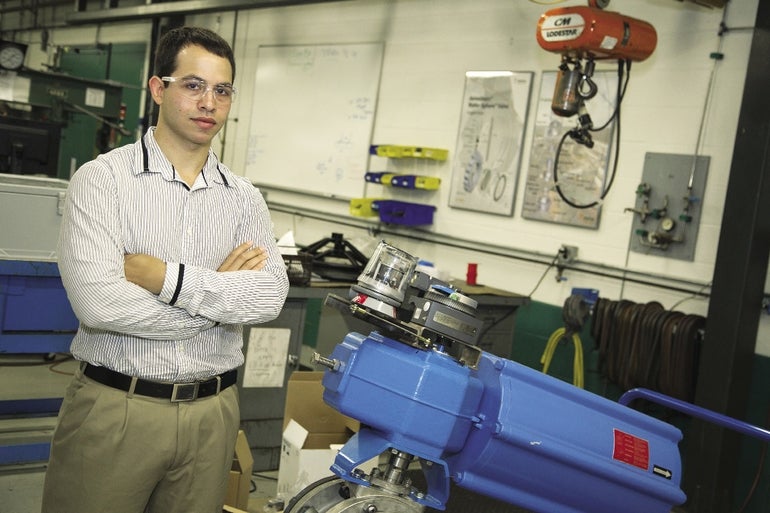Like most technically savvy manufacturers, Metso Automation in Shrewsbury needs workers who are well-educated, responsible and experienced in its industry. But Metso doesn’t worry too much about finding employees like that. Instead, it helps create them, together with Worcester Technical High School.
“Basically the relationship comes from the need for industry to have educated and technically skilled employees right out of high school,” said Emmanuel Gomez, supervisor of the company’s research and development lab. “One of the benefits we’ve had with partnering up with Worcester Tech is we’ve been able to get the newest up-to-date education for students, get them into our facility and have them expand on their views that they’ve had in the classroom.”
Worcester Tech, and vocational and technical high schools in general, got a moment in the spotlight in June when President Obama delivered the commencement address for the school’s class of 2014. He spoke about the school’s success in preparing workers to compete in a global economy. Part of what makes that possible there, as well as at other technical high schools in the area, is their close connections with area employers.
Kyle Brenner, director of career and technical education at Worcester Tech, said the school has a tight relationship with local businesses, which serve on advisory committees for each school department, as well as providing cooperative education and internship opportunities. In their advisory roles, employers look at the programs’ curricula and equipment and offer specific suggestions to help students get the most up-to-date training possible.
“They look at it and they say, ‘Yes, this is what we see in industry,’ or “No, we haven’t used that piece of equipment in three years,” Brenner said.
Gomez said those connections are part of what makes Worcester Tech students so valuable in Metso’s R&D lab. They’ve been trained in the skills that the company knows it needs, so they can easily pick up the work that it needs done. And once they’ve graduated, many can go straight to a job at the company if they want. Then, Gomez said, Metso may pay for them to go on to further study in fields like electromechanical or basic engineering at Quinsigamond Community College so they can continue to move up the ladder at work.
A new view of technical schools
If the traditional view of vocational high schools is as an alternative to preparing for college, that’s changing quickly. In recent years, as Worcester Tech has added more advanced placement classes and worked to boost academic standards, Brenner said he has sometimes been asked, “What about the kids that are just good with their hands?” His answer, he said, is that there’s no job that doesn’t demand academic skills. Anyone who wants to get a license in a trade has to have the reading skills to master the Massachusetts construction code, and automotive technicians need a strong grasp of computer analysis to do their jobs. Besides, Brenner said, the school sees its job as preparing students for whatever careers they want, whether or not they require a college education.
“It’s not like, ‘You’re destined to go work in the trades and that’s what you have to do,’” he said. “We open the doors. Before it was like, ‘This door is open for you. The college door is shut but the jobs door is open’.”
At Montachusett Regional Vocational Technical School in Fitchburg, James Hachey, director of vocational programs, said some kinds of employers, like machine shops, often want to hire students right out of high school so they can involve them in their own training programs. Other fields, like engineering or early childhood education, are more likely to have openings for college graduates.
Overall, Hachey said, nearly two thirds of the school’s students go on to college, while most of the rest find jobs in their chosen industries.
Assist from Common Core
Both Brenner and Hachey said their schools are working to connect academic concepts in the classroom with skills students develop in career-preparation shops and on-the-job coops. Hachey said the new requirements included in the state’s Common Core standards help teachers build those connections.
“They are making it more practical, and I think the Common Core is helping them,” he said.
Ken Baer, Monty Tech’s cooperative education and placement coordinator, said about a quarter of the school’s students get offered jobs after graduation from the places where they’ve done coops. It’s not uncommon, he said, for a student to get a job that pays $50,000 a year right out of school.
Baer said that can be the best path for some students, particularly when many college graduates are struggling to find work in their fields. He recalls one young man who went on to college for business, but ended up running a machine in a plant.
“He said, ‘I make more money here’,” Baer said. “That’s something people need to start to think about.”

